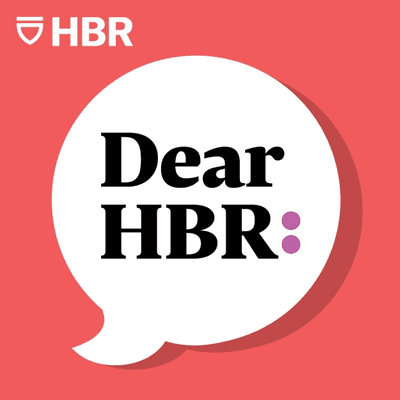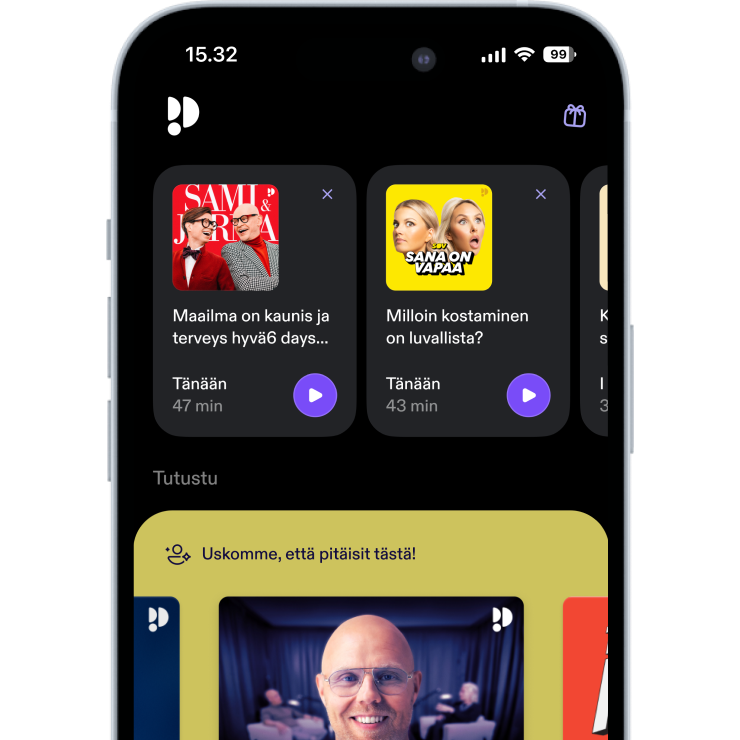
Dear HBR:
Podcast by Harvard Business Review
7 vrk ilmainen kokeilu
Kokeilun jälkeen 7,99 € / kuukausi.Peru milloin tahansa.

Enemmän kuin miljoona kuuntelijaa
Tulet rakastamaan Podimoa, etkä ole ainoa
Arvioitu 4.7 App Storessa
Lisää Dear HBR:
Work can be frustrating. How can you get along with that maddening coworker? Figure out what your unapproachable boss really wants? Motivate your demoralized team? "Dear HBR:" is here to help. With empathy, experience, and humor, veteran Harvard Business Review editors and co-hosts Alison Beard and Dan McGinn explore solutions to your workplace dilemmas. Bolstered by insights from guests and academic research, they help you navigate thorny situations to find a better way forward.
Kaikki jaksot
82 jaksotThis new podcast features real-life coaching sessions with leaders working to overcome professional challenges. In this episode, host Muriel Wilkins speaks with a woman who’s been walking a tightrope between addressing a superior’s microaggressions and making her team feel safe. Wilkins coaches this manager toward the actions she can take to improve the situation and build a healthier culture at her organization. Coaching Real leaders is part of HBR Presents, a new network of business podcasts curated by HBR editors. For a full lineup of shows, search “HBR” on your favorite podcast app or visit hbr.org/podcasts [http://www.hbr.org/podcasts].
Is it time to do something different in your career? Dan and Alison answer your questions with the help of Bruce Feiler [https://www.brucefeiler.com/], a researcher and the author of Life Is in the Transitions: Mastering Change at Any Age [https://www.amazon.com/Life-Transitions-Mastering-Change-Any/dp/1594206821/]. They talk through what to do when you’ve been out of work and can’t find a job the usual ways, you feel lost in the ambiguity of a new role, or you want to convince your boss to release you to another team. Dear HBR: is taking a break from publishing new episodes. The plan is to return after a hiatus, potentially with an updated format. Please subscribe to the podcast to stay up to date. Find out how to subscribe and listen to more episodes on the Dear HBR: page [https://hbr.org/podcasts/dear-hbr]. And feel free to email your comments and questions to dearhbr@hbr.org [dearhbr@hbr.org]. HBS Working Knowledge: Nine Unconventional Strategies For Reinventing Your Career [https://hbswk.hbs.edu/archive/working-identity-nine-unconventional-strategies-for-reinventing-your-career] by Herminia Ibarra — “Major career transitions take three to five years. The big ‘turning point,’ if there is one, tends to come late in the story. In the interim, make use of anything as a trigger. Don’t wait for a catalyst. What you make of events is more important than the events themselves. Take advantage of whatever life sends your way to revise, or at least reconsider, your story.” Book: Life Is in the Transitions: Mastering Change at Any Age [https://www.amazon.com/Life-Transitions-Mastering-Change-Any/dp/1594206821/] by Bruce Feiler — “Each of us carries around an unspoken set of assumptions that dictate how we expect our lives will unfold. These expectations come from all corners and influence us more than we admit. We’ve been led to believe that our lives will always ascend, for example, and are shocked to discover they oscillate instead. Our society tells us we should be basking in progress, but our experience tells us we are beset by slip-ups. Might this gap help explain the anxiety so many of us feel?” HBR:Disrupt Yourself [https://hbr.org/2012/07/disrupt-yourself-3]by Whitney Johnson — “Current stakeholders in your life and career will probably encourage you to avoid disruption. For many of us, though, holding steady really means slipping—as we ignore the threat of competition from younger, more agile innovators, bypass opportunities for greater reward, and sacrifice personal growth.” HBR: Managing Yourself: Five Ways to Bungle a Job Change [https://hbr.org/2010/01/managing-yourself-five-ways-to-bungle-a-job-change]by Boris Groysberg and Robin Abrahams — “People who switch organizations—whether they’re wide receivers changing football teams or general managers going to new companies—all face similar problems. It’s not just about the learning curve. Moves of all kinds entail significant internal and external challenges and transaction costs: upheaval in your home and social life; potential relocation expenses; adjustments to new cultural and political norms; navigation of unclear expectations; and the need to learn a new canon, skill set, and jargon.”
Is it hard for you to give or get feedback virtually? Dan and Alison answer your questions with the help of Marcus Buckingham [https://www.marcusbuckingham.com/about/], a cohead of the ADP Research Institute and the author of Nine Lies About Work: A Freethinking Leader’s Guide to the Real World [https://www.amazon.com/Nine-Lies-about-Work-Freethinking/dp/1633696308/]. They talk through what to do when you want to tell your boss they’re derailing virtual meetings, you’re starting a new job remotely and getting little guidance, or you want more feedback on your organization’s performance during the pandemic. From Alison and Dan’s reading list: HBR: Why Asking for Advice Is More Effective Than Asking for Feedback [https://hbr.org/2019/09/why-asking-for-advice-is-more-effective-than-asking-for-feedback] by Jaewon Yoon, Hayley Blunden, Ariella Kristal, and Ashley Whillans — “Organizations are full of opportunities to learn from peers, colleagues, and clients. Despite its prevalence, asking for feedback is often an ineffective strategy for promoting growth and learning. Our work suggests this is because when givers focus too much on evaluating past actions, they fail to provide tangible recommendations for future ones. How can we overcome this barrier? By asking our peers, clients, colleagues, and bosses foradviceinstead.” Book: Nine Lies About Work: A Freethinking Leader’s Guide to the Real World [https://www.amazon.com/Nine-Lies-about-Work-Freethinking/dp/1633696308/] by Marcus Buckingham and Ashley Goodall — “What we, as team members, want from you, our team leader, is firstly that you make us feel part of something bigger, that you show us how what we are doing together is important and meaningful; and secondly, that you can make us feel that you can see us, and connect to us, and care about us, and challenge us, in a way that recognizes who we are as individuals.” HBR: Starting a New Job — Remotely [https://hbr.org/2020/05/starting-a-new-job-remotely] by Art Markman — “You should always be proactive in getting acclimated to a new role but when you won’t work side-by-side your new colleagues for the foreseeable future, it’s especially imperative that you take an active approach to getting up to speed.” HBR: How to Manage an Employee Who’s Struggling to Perform Remotely [https://hbr.org/2020/05/how-to-manage-an-employee-whos-struggling-to-work-remotely] by Ron Carucci — “With many unfamiliar variables introduced by Covid-19, getting to the bottom of a new performance problem is more complicated. Prior to the pandemic, most leaders might have reflexively zeroed in on the underperformer as the primary unit of analysis and presumed the problem was the result of insufficient skills, lack of initiative, commitment, and/or a poor attitude.”
Is the pandemic making you rethink your commute? Dan and Alison answer your questions with the help of Ashley Whillans [https://www.hbs.edu/faculty/Pages/profile.aspx?facId=943704], a professor at Harvard Business School and the author of the new book Time Smart: How to Reclaim Your Time and Live a Happier Life [https://www.amazon.com/Time-Smart-Reclaim-Your-Happier/dp/1633698351/]. They talk through what to do when you want to work remotely but your company is against it, you’re considering a new job closer to home, or you’ve been offered a job that’s a great fit but comes with a longer commute. From Alison and Dan’s reading list: HBR: Our Work-from-Anywhere Future [https://hbr.org/2020/11/our-work-from-anywhere-future] by Prithwiraj (Raj) Choudhury — “Before 2020 a movement was brewing within knowledge-work organizations. Personal technology and digital connectivity had advanced so far and so fast that people had begun to ask, ‘Do we really need to be together, in an office, to do our work?’ We got our answer during the pandemic lockdowns. We learned that a great many of us don’t in fact need to be colocated with colleagues on-site to do our jobs. Individuals, teams, entire workforces, can perform well while being entirely distributed—and they have.” Book: Time Smart: How to Reclaim Your Time and Live a Happier Life [https://www.amazon.com/Time-Smart-Reclaim-Your-Happier/dp/1633698351/] by Ashley Whillans — “It’s not our fault we’ve ended up like this. Culturally, the inherent value of time has been suppressed. Society teaches us that we should hero-worship people who never leave the office. Moreover, rising income inequality makes us feel as if our world could collapse tomorrow if we don’t spend every moment working, or at least appearing to work. These factors create what I call time traps, which lead most of us to feel chronically time-poor.” HBR: Reclaim Your Commute [https://hbr.org/2017/05/reclaim-your-commute] by Francesca Gino, Bradley Staats, Jon M. Jachimowicz, Julia Lee, and Jochen I. Menges — “Most people who have long commutes feel like helpless victims enduring a necessary evil. As a result, they arrive at their jobs and homes depleted, and their performance and well-being suffer. But it is possible to improve your commute by turning it into a more positive experience and, when possible, reducing it.” HBR: Get More Done During Your Commute [https://hbr.org/2015/01/get-more-done-during-your-commute] by Peter Bregman — “Then, during your evening commute, think back through your day hour by hour and glean wisdom and connection from it. How did the day go? What worked? What didn’t? What do you want to do the same – or differently – tomorrow? With whom can you share feedback? Who should you thank? What happened today for which you can feel grateful?”
What will it take for you to feel safe at work again? Dan and Alison answer your questions with the help of Ethan Bernstein [https://www.hbs.edu/faculty/Pages/profile.aspx?facId=17441], a professor at Harvard Business School. They talk through what to do when your essential employees are staying home despite increased safety measures, you want to redesign your open office to make it work for the new normal, or you’re seeing a growing divide between workers who have to come in and those who can work from home. From Alison and Dan’s reading list: HBR: How to Make Sure People Won’t Hate Your New Open Office Plan [https://hbr.org/2018/01/sgc-research-when-moving-to-an-open-office-plan-pay-attention-to-how-your-employees-feel] by Brandi Pearce and Pamela Hinds — “Despite optimistic assertions about the benefits of open office space, outcomes are mixed. In some cases, open-plan office designs are reported to increase collaboration, employee satisfaction, and communication, but in others these new spaces are criticized for creating distractions, reducing privacy and autonomy, and undermining employee motivation and satisfaction.” The New Yorker: The Open-Office Trap [https://www.newyorker.com/business/currency/the-open-office-trap] by Maria Konnikova — “An open environment may even have a negative impact on our health. In a recent study of more than twenty-four hundred employees in Denmark, Jan Pejtersen and his colleagues found that as the number of people working in a single room went up, the number of employees who took sick leave increased apace. Workers in two-person offices took an average of fifty per cent more sick leave than those in single offices, while those who worked in fully open offices were out an average of sixty-two per cent more.” HBR: 7 Factors of Great Office Design [https://hbr.org/2016/05/7-factors-of-great-office-design] by Peter Bacevice, Liz Burow, and Mat Triebner — “The design and outfitting of workspace is a major capital investment for any organization that can affect a number of business outcomes, including productivity, employee satisfaction, engagement, talent recruitment, and brand impact. Given the myriad ways to design and plan a space, leaders should approach workplace design in a strategic way. Imitating the latest fads start-ups are adopting won’t necessarily get you the results your company desires; asking the right questions — and, above all, listening to employees’ answers — will.” HBR: Why You Should Rotate Office Seating Assignments [https://hbr.org/2018/03/why-you-should-rotate-office-seating-assignments] — “Interestingly, the change to employees’ physical space seemed to boost performance even more than did another switch the company made (which Lee also studied), from individual incentives to fixed wages. In addition, the effect generated by the relocation was quick—the rise in cross-category deals occurred within a month—and it increased throughout the 80 days postmove.”

Arvioitu 4.7 App Storessa
7 vrk ilmainen kokeilu
Kokeilun jälkeen 7,99 € / kuukausi.Peru milloin tahansa.
Podimon podcastit
Mainoksista vapaa
Maksuttomat podcastit

































